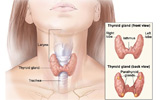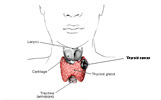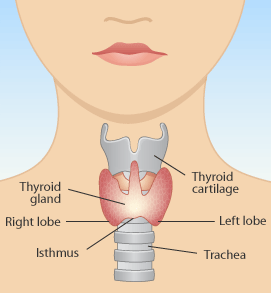Information about the thyroid and parathyroid glands
Parathyroid
 The parathyroid glands are four pea-sized glands located in the neck – though their names are similar, the thyroid and parathyroid glands are entirely different glands, each producing distinct hormones with specific functions.
The parathyroid glands are four pea-sized glands located in the neck – though their names are similar, the thyroid and parathyroid glands are entirely different glands, each producing distinct hormones with specific functions.
Parathyroid surgery
 Surgery to remove the enlarged parathyroid gland (or glands) is the main treatment for primary hyperparathyroidism and parathyroid adenoma and cures over 95 percent of patients. Surgery may be a minimally invasive parathyroidectomy procedure or an open parathyroidectomy.
Surgery to remove the enlarged parathyroid gland (or glands) is the main treatment for primary hyperparathyroidism and parathyroid adenoma and cures over 95 percent of patients. Surgery may be a minimally invasive parathyroidectomy procedure or an open parathyroidectomy.
Thyroid cancer
 Some of the symptoms that may point to cancer include; a lump, or nodule in the neck — especially in the front of the neck, in the area of the Adam’s apple, enlargement of the neck, enlarged of neck lymph glands, hoarseness, difficulty speaking normally, and voice changes.
Some of the symptoms that may point to cancer include; a lump, or nodule in the neck — especially in the front of the neck, in the area of the Adam’s apple, enlargement of the neck, enlarged of neck lymph glands, hoarseness, difficulty speaking normally, and voice changes.
Thyroid surgery
 Some of the reasons that surgery may be needed include; overactivity (hyperthyroidism or thyrotoxicosis) and medical management is unsuccessful, enlarged or nodular producing a goitre, producing pressure symptoms causing breathing difficulties, choking, or the sensation of lump in the throat.
Some of the reasons that surgery may be needed include; overactivity (hyperthyroidism or thyrotoxicosis) and medical management is unsuccessful, enlarged or nodular producing a goitre, producing pressure symptoms causing breathing difficulties, choking, or the sensation of lump in the throat.
Thyroglossal cyst – Sistrunk procedure
 Sistrunk’s procedure is an operation to effectively treat thyroglossal duct cyst. A thyroglossal cyst may be a painless, smooth and cystic midline neck lump. However, they may become infected and cause pain and swelling.
Sistrunk’s procedure is an operation to effectively treat thyroglossal duct cyst. A thyroglossal cyst may be a painless, smooth and cystic midline neck lump. However, they may become infected and cause pain and swelling.
About the thyroid
The thyroid gland is a soft, butterfly shaped gland that lies wrapped around the windpipe below the larynx. The normal gland is a small gland that wraps around the trachea or windpipe. The job of the thyroid is to convert iodine from the diet into hormones. These hormones help regulate metabolism. The hormone levels control most of your body’s functions including temperature, heart rate and growth.
Thyroid problems

Around 5% of the population worldwide have a goitre or benign enlargement and up to 50% of the elderly population have a solitary nodule. Most nodules are benign, but some may produce excess hormone and others may be tumours.
Those people who have received radiation treatment to the head and neck regions for conditions such as acne, thymus enlargement, recurrent tonsillitis, chronic ear infections and birthmarks are at a greater risk for cancer.
Underactive symptoms
Symptoms from an underactive gland include:
- fatigue, exhaustion
- feeling run down and sluggish
- depression
- difficulty concentrating, brain fog
- unexplained or excessive weight gain
- dry, coarse and/or itchy skin
- dry, coarse and/or thinning hair
- feeling cold, especially in the hands and feet
- constipation
- muscle cramps
- increased menstrual flow and more frequent periods
- infertility/miscarriage
Overactive symptoms
Symptoms from an overactive gland include:
- nervousness
- irritability
- increased perspiration
- thinning of your skin
- fine brittle hair
- muscular weakness especially involving the upper arms and thighs
- shaky hands
- panic disorder
- insomnia
- racing heart
- more frequent bowel movements
- weight loss despite a good appetite
- lighter flow, less frequent menstrual periods
Management
The initial evaluation for patients with nodules should include a medical history, physical examination and blood tests. Toxic (hyperfunctioning) nodules are rarely malignant and require a radionuclide scan for assessment. Nodules in patients with normal gland function require fine needle biopsy which provides specific information about the nature of the nodule. Patients with atypical fine needle biopsy have up to a 20% risk of malignancy and require appropriate surgery. The key issue for patients with nodules is whether surgery is required to remove the nodule for accurate diagnosis by pathology.
Thyroid surgery by an ENT – head and neck surgeon
- ENT – head and neck surgeons can provide a complete evaluation and treatment options regarding thyroid problems
- An ENT specialist can receive up to 15 years of university and post-graduate training in surgery, concentrating on ear, nose and throat procedures
- Because they study the complex anatomy, physiology, and pathology of the entire head and neck, ENT specialists are uniquely qualified to perform the procedures that affect the thyroid gland
For more information, Click here.




